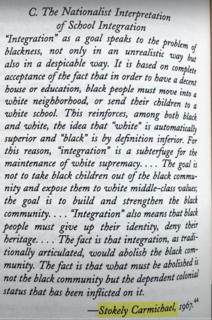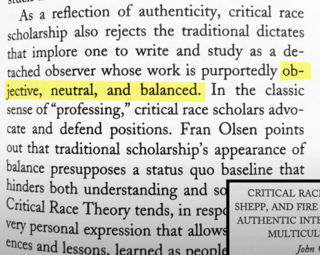At the bottom of this post is a link to a 21 minute video I'd encourage you to watch. I'll attempt to summarize some of the important ideas in the video here. First off, the video cites 6 books as being the essential foundation of CRT (titles and author lists summarized):
1 - CRT: The Key Writings, Crenshaw +
2 - How to be an Antiracist, Kendi
3 - CRT: an intro, Delgado and Stefancic
4 - Words that Wound, Matsuda +
5 - White Fragility, DiAngelo
6 - Traditional and Critical Theory, Horkheimer (older, foundational)
Throughout the video, important claims about CRT are cited with screenshots of pages from these books. This seems like a very sound approach to defining CRT.
== Key Ideas in CRT
1 - CRT began as a deep dissatisfaction with the civil rights discourse of the 60s and 70s. Two important values that came out of this period were:
- color-blindness, the idea that laws should apply equally to everyone
- racial integration, the idea that society should be a melting pot and that cultural exchange and power should be shared
CRT, believes these values are flawed. Instead, CRTists promote race consciousness, forming collectives without integrating into society. (A la Malcolm X)
2 - CRT's main analysis approach is to "deconstruct" and then "reconstruct" aspects of society. Once society has been deconstructed, CRT will attempt to construct a new social reality, and direct its operation.
As part of this process, CRT has determined that equality theory, legal reasoning, rationalism, and neutral constitutional law are to be undermined. As an example, CRT considers the academic values of:
- objectivity
- neutrality
- and balance,
to be "white values", and not universally held. And anyone - regardless of skin color - who values objectivity, neutrality, and balance is "white" in practice. Instead of these academic values, CRT promotes "authenticity", which means resisting integration into the "white world". In order to achieve this, CRT promotes subjectivity and political bias. Instead of evidence, CRT promotes personal story-telling, a.k.a. "lived experience".
3 - Racism is THE defining issue of our time. You can either be a racist or an antiracist. An antiracist makes fighting racism the most important societal issue. You CANNOT be non-racist. If you don't act like a racist, BUT you don't hold racism as the most important issue, you are a racist.
4- America is a regime of white supremacy. It's laws, educational system, politics and culture are all in support of white supremacy and must be undone. The replacement plan is not yet clear, but includes:
- making hate speech illegal
- voter redistricting to support race consciousness
- passing an antiracist constitutional amendment and creating a Department of AntiRacism that would oversee all law making.
- embedding CRT into all aspects of academia
- ending capitalism
==
Now one might argue that the video maker has cherry picked some of the most controversial ideas from these books. To that I would say, perhaps, but so what? If you think there is an alternate "CRT-lite", that might be great news, can you provide citations?


